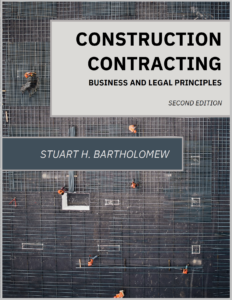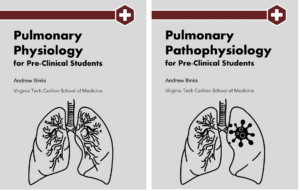It’s been well over a year since Virginia Tech’s open access policy was approved by the Board of Visitors on March 22, 2021. So how many article deposits has VTechWorks received under the policy? For the purposes of recording statistics, we’ll define the year as July 1 through June 30. Because the policy went into effect in late March, we’ll define the first “year” as March 22, 2021 through June 30, 2022 (15 months). For this time period, 196 accepted versions were deposited into VTechWorks (almost all through Elements). Continue reading
Open@VT
Open Access, Open Data, and Open Educational Resources
Announcing Construction Contracting, second edition: A Rights-Reversion Project
The Open Education Initiative at the University Libraries at Virginia Tech is pleased to announce Construction Contracting: Business and Legal Principles, Second Edition by Stewart H. Bartholomew as a CC BY NC-SA 4.0 open textbook. Construction Contracting is the third rights reversion project undertaken by the Open Education Initiative.
ABOUT THE BOOK
Construction Contracting: Business and Legal Principles, Second Edition by Stuart H. Bartholomew is a 400+ page university-level introduction to construction contracting as it applies to typical, every-day situations. It explains “theoretical” ideas in terms of what really happens in practice, and emphasizes the more common case law holdings and industry customs that help avoid troublesome legal issues during the completion of a project.
The text is freely available in PDF and online in Pressbooks. Instructors reviewing or adopting this book for a course are encouraged to report their interest at: https://bit.ly/construction_contracting
The book is released with permission of the Bartholomew Estate by the University Libraries at Virginia Tech under a Creative Commons Attribution NonCommercial-ShareAlike 4.0 international license. Rights were reverted from the previous publisher to the estate prior to Virginia Tech’s agreement with the Estate. The book was previously published by Pearson Education, Inc. under their Prentice Hall imprint in 2002 (ISBN: 1-13-091055-4) Any derivatives of this work must comply with the requirements of the Creative Commons license and include the following statement, “This material was previously published by Pearson Education, Inc.”
The Open Education Initiative at the University Libraries at Virginia Tech is grateful to the Estate of Mr. Bartholomew for their willingness to pursue rights-reversion of the book and permission to release it under a CC BY NC-SA 4.0 license.
Two New Open Textbooks for Medical School: Pulmonary Physiology for Pre-Clinical Students and Pulmonary Pathophysiology for Pre-Clinical Students by Andrew Binks
Virginia Tech Carilion School of Medicine and Virginia Tech Publishing are pleased to announce publication of two new open textbooks by Andrew Binks, titled Pulmonary Physiology for Pre-Clinical Students and Pulmonary Pathophysiology for Pre-Clinical Students. These works are the fourth and fifth in a five-volume series of open textbooks for pre-clinical medical education by Renee LeClair and Andrew Binks.
Instructors reviewing or adopting texts are requested to register their interest at: https://bit.ly/interest-preclinical.
Pulmonary Physiology for Pre-Clinical Students (101 pages) is an undergraduate medical-level resource for foundational knowledge of pulmonary physiology.
Pulmonary Pathophysiology for Pre-Clinical Students (82 pages) is an undergraduate medical-level resource for foundational knowledge of pulmonary pathophysiology. The text assumes that the students will have an understanding of basic pulmonary physiology that will be helpful to understand the content presented here.
Continue readingNew Open Textbook: Cardiovascular Pathophysiology for Pre-Clinical Students by Andrew Binks

Virginia Tech Carilion School of Medicine and Virginia Tech Publishing are pleased to announce publication of a new open textbook by Andrew Binks, titled Cardiovascular Pathophysiology for Pre-Clinical Students.
Cardiovascular Pathophysiology for Pre-Clinical Students (https://doi.org/10.21061/cardiovascularpathophysiology) is an undergraduate medical-level resource for foundational knowledge of common cardiovascular diseases, disorders and pathologies. This text is designed for a course pre-clinical undergraduate medical curriculum and it is aligned to USMLE(r) (United States Medical Licensing Examination) content guidelines. The text is meant to provide the essential information from these content areas in a concise format that would allow learner preparation to engage in an active classroom. Clinical correlates and additional application of content is intended to be provided in the classroom experience. The text assumes that the students will have an understanding of basic cardiovascular physiology that will be helpful to understand the content presented here. This resource should be assistive to the learner later in medical school and for exam preparation given the material is presented in a succinct manner, with a focus on high-yield concepts.
Continue readingNew Open Textbook: Aerospace Structures by Eric Raymond Johnson

Cover: Kindred Grey
Virginia Tech’s Kevin T. Crofton Department of Aerospace and Ocean Engineering and Virginia Tech Publishing are pleased to announce publication of a new open textbook by Eric Raymond Johnson, Ph.D., titled, Aerospace Structures.
Aerospace Structures (https://doi.org/10.21061/AerospaceStructures) is a 600+ page text and reference book for junior, senior, and graduate-level aerospace engineering students.
The text begins with a discussion of the aerodynamic and inertia loads acting on aircraft in symmetric flight and presents a linear theory for the statics and dynamic response of thin-walled straight bars with closed and open cross-sections. Isotropic and fiber-reinforced polymer (FRP) composite materials including temperature effects are modeled with Hooke’s law. Methods of analyses are by differential equations, Castigliano’s theorems, the direct stiffness method, the finite element method, and Lagrange’s equations. There are numerous examples for the response of axial bars, beams, coplanar trusses, coplanar frames, and coplanar curved bars. Failure initiation by the von Mises yield criterion, buckling, wing divergence, fracture, and by Puck’s criterion for FRP composites are presented in the examples.

